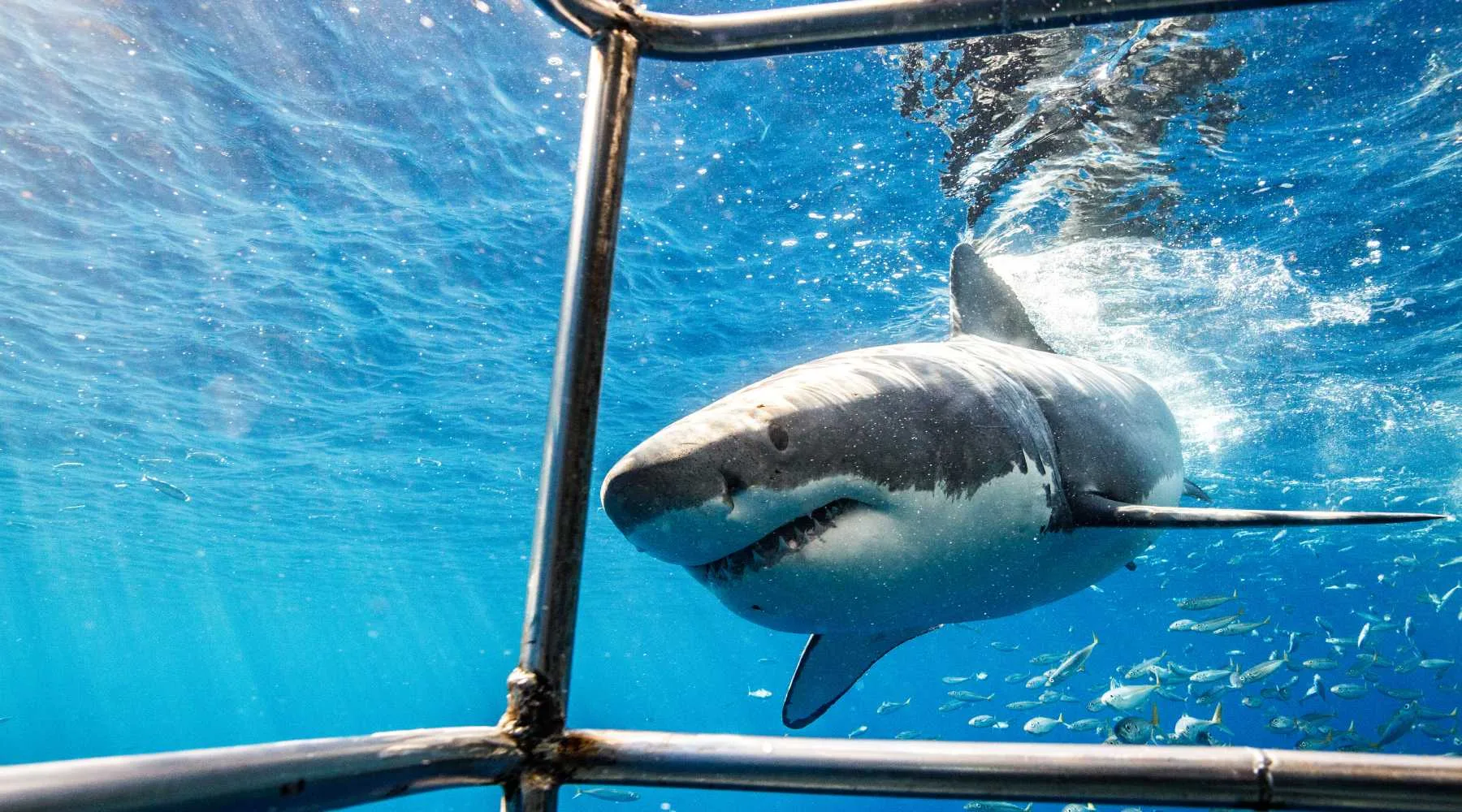Travel insurance for shark cage diving
Planning to swim with the sharks? Find a travel insurance policy to cover it.


It may seem odd, but yes - travel insurance can cover shark cage diving. However, you'll need to make sure you pick a travel insurance company that specifically includes it in the product disclosure statement. You'll also need to satisfy a few other requirements - this could include holding a dive license, using a licensed shark diving operator, or more.
Most shark cage dives you're likely to do will be in Australia. Mexico banned it in 2023, and shark numbers have fallen in South Africa due to increased numbers of Orcas in the area. So these days South Australia is the top destination to divers.
You should still get travel insurance for Australian shark cage diving, even if your trip is fully domestic. Any medical bills should be covered for Australians by either Medicare or private health insurance, but other travel insurance bills will not be. Domestic travel insurance still has a lot of value if things go south (excuse the pun).
Shark diving is considered to be generally safe, as long as it's done with a high quality, licensed operator. Because of the risks of both diving and...you know...sharks, operators make a really big effort to make sure their dives are extremely safe.
That said, it is still considered a risky activity, so you shouldn't take it lightly. That's why it's really important to have travel insurance that covers shark cage diving specifically.
| Brand | Additional conditions that apply | Enquire |
|---|---|---|
| Medibank doesn't mention shark cage diving on PDS, but it does cover scuba diving which requires an open water diving certificate or being with a qualified instructor. | Bonus | |
| Where your journey is necessarily extended due to an unforeseen circumstance outside your control, your period of insurance will be extended until you are physically able to travel home by the quickest and most direct route. The period of insurance will not be extended for any other reason. | Bonus | |
 | Shark cage diving under appropriate supervision. | Finder Award |
 | Covered provided you are using an artificial breathing apparatus at a depth no greater than 10 metres and must hold an open water diving licence recognised in Australia or dive with an instructor licensed. | Bonus |
 | Cover is available if the dive is provided by a licensed commercial operator. Unfortunately, cover isn't available in the USA or Canada. | Bonus |
 | Covered, provided that the activity is provided by a licenced commercial operator (please note that cover for these activities is not available in the USA or Canada). | Get quote |
| World2Cover's PDS doesn't mention shark cage diving specifically. However, underwater diving using an artificial breathing apparatus is covered, as long as you're with a licensed diver. | Get quote | |
| There's no mention of shark cage diving on Cover-More's PDS. However, scuba diving done with a diving school or qualified instructor is covered. | Bonus | |
| SCTI will cover shark cage diving under certain conditions. Their PDS says of underwater activities "We won't cover any claims, costs or losses or liabilities directly or indirectly arising from, related to or associated with Underwater activities that involve using artificial breathing equipment except if you hold an open-water diving certificate, or you're diving with a qualified instructor." We gave SCTI a call to get more details - we were told that if shark cage diving is done as a leisure activity and with a licensed operator, it will be covered. However, if the dive was associated with training or a business activity, it would be excluded from your cover. | ||
| AU post doesn't mention shark cage diving on PDS, but it does cover scuba diving which requires an open water diving certificate or being with a qualified instructor. | Get quote | |
| Easy travel insurance's PDS doesn't cover shark cage diving, but it does cover scuba diving if you have an open water diving certificate or are with a qualified instructor. | Get quote | |
| The PDS for Travel Insurance Saver doesn't mention shark cage diving, but it does cover scuba diving, provided you have an open water diving certificate or are accompanied by a qualified instructor. | Get quote | |
| TID might cover shark cage diving, we couldn't quite get a straight answer. The PDS only refers to scuba diving, saying "We will not cover scuba diving unless you hold an open water diving licence or you were diving under licensed instruction." We gave TID a call to learn more, but we weren't able to get any extra clarification on whether shark cage diving would be covered or not. | More info | |
 | Covered provided you are using an artificial breathing apparatus at a depth no greater than 10 metres, and hold an open water diving licence recognised in Australia or dive with an instructor licensed for these activities. | |
Note: This information was last updated November 2024
Scuba diving itself is an inherently risky activity with certain conditions and restrictions, and potential risks include decompression sickness or nitrogen poisoning, barotrauma and others. Cage diving alone carries its own set of risks. When cage diving with scuba gear, you must in all cases either hold a recognised open water diving licence or be under the supervision of a licensed instructor while in the water. Even then, some insurers will not cover shark cage diving under any circumstances, while others have additional requirements. These are typical conditions under which insurers cover shark cage diving:
To be covered for shark cage diving you must:
When signing up for an insurance policy, you have a duty of disclosure. This is a legal obligation to tell the insurer about anything they should reasonably know which increases the risk of insuring you. Typically, you can fulfil your duty of disclosure simply by filling out the forms and answering questions honestly. If you are not sure whether or not you will be covered and it is not clear by reading the PDS, it is always best to disclose the activity you will be participating in.
You should be able to know exactly how and when your travel insurance policy will cover shark cage diving just by reading the PDS. If it isn't clear, you should raise the issue with your insurer.
The cost of including shark cage diving in your travel insurance policy can vary between insurers. It will either be covered free of charge, covered for an additional premium or excluded altogether, for example*:
*The above information was last verified in November 2024. To make sure that you're covered, always read the PDS before buying a policy.
Trek confidently with one of these 10+ brands that offer trekking insurance.
Whilst playing golf on your trip imposes a small risk of injury, there is still a risk of having your equipment stolen. Make sure you are covered ahead of your next with an appropriate Golf Insurance policy.
A guide to finding travel insurance brands that cover bungee jumping and what is covered.
Find out which travel insurance brands provide cover for Skydiving.
Planning to paraglide or parasail? Make sure your travel insurance policy covers you.
Guide to finding travel insurance that covers mountain biking.
Find out whether or not travel insurance covers you for scuba diving.
This guide takes a closer look at motorcycle travel insurance and makes some suggestions regarding levels of cover and ways to stay safe when riding abroad.